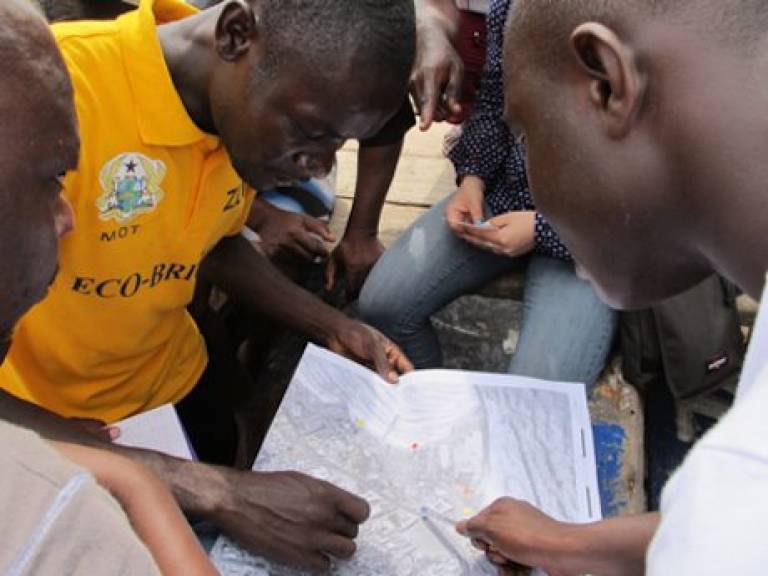Cultivating change in Accra
28 May 2012
Students from the DPU’s MSc in Environment and Sustainable Development have recently returned from conducting fieldwork overseas in Accra, Ghana.

Their work on the ground was coordinated by Adriana Allen, Alex Frediani, Rita Lambert, Etienne von Bertrab and Matthew Wood-Hill and supported by People’s Dialogue on Human Settlements (PD), the Ghana Federation of the Urban Poor and a group of extension officers from the Ministry of Food and Agriculture (MOFA).
The research focused on understanding the relationship between urban food production and the city’s rapid urbanisation. Using this as an entry point, students navigated the complexity of different land and planning systems (customary vs. statutory) in their efforts to map and assess the potential of Urban Agriculture (UA) towards the environmentally just urbanisation of Accra and the sustenance of these practices as valid livelihood strategies.
Within the context of rapid urbanisation that Sub-Saharan Africa is undergoing, unemployment along with the growing demand for food in cities are perpetuating cycles of malnutrition and poverty. Urban agriculture can be used as a mechanism for breaking this cycle when integrated in a comprehensive and inclusive poverty alleviation strategy that combines social and environmental aims. At the same time, whether for self-consumption or for marketing aims, UA can play a vital role in enhancing food security. In the context of particularly marginalised groups, including migrants, UA can also contribute to long term livelihood diversification and to support the right to farm in the city, thus increasing the resilience of such groups to cope with shocks and to strengthen their voice.
UA can also bring major environmental benefits not just for the areas in which it is practiced but also the wider city environment. It offers a great potential to close the nutrient cycle by using organic solid and liquid waste as an input into farming practices and can minimize substantially the amount of urban waste that needs to be disposed of. In addition, by producing food close to where it is consumed the food footprint can be reduced substantially. This is particularly important in the context of the peak oil crisis and the efforts to combat climate change. What is more, cities require green open spaces, not only to regulate temperature and reduce water run-off but also to contribute to the wellbeing of citizens. UA can fulfil all of these crucial functions.
The research undertaken examines the extent to which the aforementioned potentials can be realised in the context of Accra, a city characterised by the eviction of everyday farming practices due to land speculation and real estate development processes. The five month research project involved a comprehensive mapping of five distinctive areas within the city and a qualitative exploration of the living and working conditions of different social groups and of the sub-systems through which food is produced within Accra, such as rain-fed and irrigated vegetable production, animal husbandry, fishing and backyard gardening.
 Close
Close

